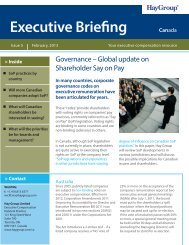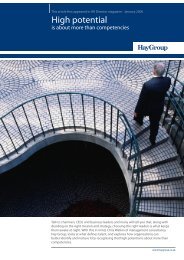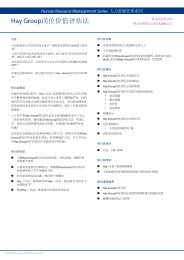Labour Law & Salary Trends in Libya - Hay Group
Labour Law & Salary Trends in Libya - Hay Group
Labour Law & Salary Trends in Libya - Hay Group
Create successful ePaper yourself
Turn your PDF publications into a flip-book with our unique Google optimized e-Paper software.
BENEFITS &<br />
COMPENSATION<br />
INTERNATIONAL<br />
TOTAL REMUNERATION AND<br />
PENSION INVESTMENT
Post–revolution HR:<br />
<strong>Labour</strong> <strong>Law</strong> & <strong>Salary</strong> <strong>Trends</strong> <strong>in</strong> <strong>Libya</strong><br />
Farhan Mahmood<br />
Farhan Mahmood is a consultant work<strong>in</strong>g <strong>in</strong> the Dubai office of global consultancy<br />
<strong>Hay</strong> <strong>Group</strong>. His expertise lies <strong>in</strong> his familiarity with the best market practices and policies<br />
on reward through work<strong>in</strong>g closely with organizations <strong>in</strong> <strong>Libya</strong>, Egypt and Jordan.<br />
Mr Mahmood grew up <strong>in</strong> the Saudi Arabian capital of Riyadh and has a Bachelor of Arts<br />
degree <strong>in</strong> Economics and Political Science from Clark University, Massachusetts.<br />
The <strong>Libya</strong>n Government’s actions aimed at<br />
reviv<strong>in</strong>g the crippled economy, address<strong>in</strong>g<br />
security concerns and retak<strong>in</strong>g control of<br />
the oil and gas <strong>in</strong>dustry will shape the HR<br />
landscape for many years to come. Despite<br />
large-scale political change, labour law<br />
under the new regime rema<strong>in</strong>s unaltered<br />
from pre-revolutionary times and HR professionals face<br />
challenges typical of frontier markets.<br />
For the past 10 years, my firm has been carry<strong>in</strong>g out<br />
annual compensation and benefit studies <strong>in</strong> <strong>Libya</strong> and<br />
this year has witnessed a return to pre-revolutionary<br />
participation levels <strong>in</strong> its annual study, which is a<br />
testament to the <strong>in</strong>creas<strong>in</strong>g <strong>in</strong>terest and <strong>in</strong>vestment <strong>in</strong><br />
this fasc<strong>in</strong>at<strong>in</strong>g market.<br />
Attract<strong>in</strong>g and reta<strong>in</strong><strong>in</strong>g skilled employees <strong>in</strong> <strong>Libya</strong><br />
represents a challenge, due to talent shortages <strong>in</strong><br />
technical oil and gas roles, production, f<strong>in</strong>ance,<br />
account<strong>in</strong>g and HR, which are familiar challenges <strong>in</strong> the<br />
emerg<strong>in</strong>g and frontier markets of Africa and the<br />
Middle East. Like its close neighbours <strong>in</strong> the GCC, <strong>Libya</strong><br />
has a nationalization policy aimed at help<strong>in</strong>g <strong>Libya</strong>n<br />
citizens <strong>in</strong>to the workforce, especially <strong>in</strong> promot<strong>in</strong>g<br />
them up the ladder <strong>in</strong>to more senior and better-paid<br />
roles. The policy, which aims to tackle the high<br />
unemployment rate, places further pressure on<br />
organizations faced with a relatively small talent pool<br />
from which to select candidates.<br />
ECONOMIC DIVERSIFICATION<br />
<strong>Libya</strong> is considered one of Africa’s wealthier countries,<br />
hav<strong>in</strong>g the cont<strong>in</strong>ent’s largest proven oil reserves, and is<br />
one of the largest oil producers <strong>in</strong> the region, followed by<br />
Nigeria and Angola. <strong>Libya</strong> was only moderately hit by the<br />
economic and f<strong>in</strong>ancial crisis, although there was a sharp<br />
dip <strong>in</strong> oil production and export dur<strong>in</strong>g the revolution and<br />
immediately afterwards, when exports all but halted. As<br />
the global demand for oil helps prices recover, the<br />
country enjoys one of the highest per capita gross<br />
domestic products <strong>in</strong> Africa. Its high GDP is courtesy of its<br />
small population <strong>in</strong> relation to significant revenues from<br />
the energy sector. However, the spoils of the oil <strong>in</strong>dustry<br />
are distributed unevenly and many citizens live <strong>in</strong> poverty.<br />
<strong>Libya</strong>’s economy has been historically dependent on<br />
hydrocarbons, which account for nearly 80% of GDP, and<br />
generate more than 90% of government revenues<br />
and 97% of export earn<strong>in</strong>gs. Pre- and post-revolution,<br />
the Government has tried to focus on non-hydrocarbon<br />
<strong>in</strong>dustries. S<strong>in</strong>ce much of the oil <strong>in</strong>dustry is operated by<br />
mult<strong>in</strong>ational companies and the region is prone to<br />
volatility, work <strong>in</strong> the oil and gas sector is not seen as<br />
reliable <strong>in</strong> terms of job security. Construction, property<br />
development, bank<strong>in</strong>g and even tourism are areas <strong>in</strong>to<br />
which the Government is try<strong>in</strong>g to diversify.<br />
With the new regime came economic liberalization, plus<br />
the lift<strong>in</strong>g of trade sanctions and an aggressive<br />
rebuild<strong>in</strong>g and restoration programme and, because of<br />
this, <strong>in</strong>ternational trade and foreign direct <strong>in</strong>vestment<br />
<strong>in</strong>to <strong>Libya</strong> has <strong>in</strong>creased considerably <strong>in</strong> the past few<br />
months. The Government is <strong>in</strong>creas<strong>in</strong>gly <strong>in</strong>vest<strong>in</strong>g<br />
revenue outside the oil sector and has embarked on an<br />
ambitious plan to upgrade the country’s <strong>in</strong>frastructure,<br />
with construction already underway on new roads,<br />
airports, railways and hous<strong>in</strong>g.<br />
Alongside domestic efforts to develop outside the<br />
hydrocarbon sector, there is renewed <strong>in</strong>ternational<br />
<strong>in</strong>terest follow<strong>in</strong>g favourable announcements from the<br />
<strong>Libya</strong>n National Oil Company (NOC), which is aim<strong>in</strong>g to<br />
reach the pre-revolutionary levels of production and<br />
export by the end of 2013. The NOC has also recently<br />
been <strong>in</strong>volved <strong>in</strong> discussions to re-establish a presence<br />
from some of the foreign oil and gas companies that<br />
halted operations or relocated dur<strong>in</strong>g the postrevolutionary<br />
crisis.<br />
The <strong>Libya</strong>n economy is forecast to grow at an annual<br />
average of 9% dur<strong>in</strong>g the period 2013-16. It is expected<br />
that public and private <strong>in</strong>vestment, especially <strong>in</strong><br />
<strong>in</strong>frastructure and the restoration of oil and gas, will<br />
cont<strong>in</strong>ue to be the ma<strong>in</strong> drivers of growth. However, the<br />
steady liberalization of the economy will also result <strong>in</strong><br />
reasonably strong <strong>in</strong>creases <strong>in</strong> private consumption.<br />
THE LABOUR MARKET<br />
The pressure on the labour market rema<strong>in</strong>s high,<br />
particularly for talented employees at managerial and<br />
professional levels. One of the greatest challenges that<br />
companies operat<strong>in</strong>g <strong>in</strong> <strong>Libya</strong> face is the scarcity of<br />
skilled workers and well-qualified <strong>in</strong>dividuals. Accord<strong>in</strong>g<br />
to the ‘<strong>Hay</strong> <strong>Group</strong> 2012 <strong>Libya</strong> Compensation and Benefits<br />
Report’, the demand for skilled workers, especially <strong>in</strong><br />
production and eng<strong>in</strong>eer<strong>in</strong>g roles, rema<strong>in</strong>s very high.<br />
Furthermore, the displacement of many foreign-owned<br />
organizations as well as expatriate employees has<br />
1
caused fluctuations <strong>in</strong> the market over the last two<br />
years. Before the crisis, <strong>Libya</strong> had a large population of<br />
north African migrant workers from such countries as<br />
Egypt, Algeria and Tunisia, most of whom left dur<strong>in</strong>g the<br />
revolution. In order to return and take up jobs, these<br />
migrant workers need to apply under a new visa system<br />
and go through the recruitment and selection processes<br />
aga<strong>in</strong>. This extra dimension adds to the squeeze on<br />
talent.<br />
Another challenge fac<strong>in</strong>g both the Government and<br />
private-sector organizations <strong>in</strong> <strong>Libya</strong> is the high rate<br />
of unemployment which rema<strong>in</strong>s at 25% and has<br />
been a major issue for the nation over the last<br />
decade. <strong>Libya</strong> has a population of around six million, half<br />
of which is under the age of 20. The key<br />
challenge for candidates look<strong>in</strong>g for work is cited as a<br />
need for English-language and technical skills, which are<br />
not taught enough <strong>in</strong> schools. This shortage is<br />
<strong>in</strong>creas<strong>in</strong>gly affect<strong>in</strong>g the ability of <strong>Libya</strong>ns to work for<br />
foreign and mult<strong>in</strong>ational companies <strong>in</strong> a global economy.<br />
DEMAND FOR LOCAL TALENT<br />
The <strong>Libya</strong>n Government had long been an advocate of<br />
nationalization <strong>in</strong> foreign-owned organizations and<br />
encouraged mult<strong>in</strong>ationals to recruit <strong>Libya</strong>n employees<br />
to help transfer knowledge, build a susta<strong>in</strong>able<br />
workforce and reduce unemployment. One such<br />
<strong>in</strong>itiative was to make it compulsory to employ a <strong>Libya</strong>n<br />
national as Deputy General Manager shadow<strong>in</strong>g a<br />
<strong>Libya</strong>n-based expatriate manager. The ‘shadow<strong>in</strong>g<br />
concept’ is a term used for a <strong>Libya</strong>n national who is<br />
be<strong>in</strong>g groomed to take on the role of the expatriate<br />
manager, thereby support<strong>in</strong>g the drive to nationalize the<br />
workforce. This is a challenge <strong>in</strong> itself for HR, which has<br />
a responsibility to ensure that the <strong>Libya</strong>n national really<br />
is be<strong>in</strong>g coached and mentored and that the expatriate<br />
General Manager is motivated and even <strong>in</strong>centivized to<br />
do so.<br />
In addition, the <strong>Libya</strong>n NOC is press<strong>in</strong>g <strong>in</strong>ternational oil<br />
companies to take up local talent on a larger scale and<br />
at all levels of seniority as part of the nationalization<br />
process. Another challenge lies there<strong>in</strong>: the talent pool<br />
is relatively small and, <strong>in</strong> many cases, a <strong>Libya</strong>n with the<br />
necessary qualifications and skills for a particular job<br />
cannot be found. S<strong>in</strong>ce the revolution, this policy has<br />
become even more difficult to implement because of the<br />
level of displacement and the <strong>in</strong>ability to compromise<br />
on the technical know-how at this critical juncture <strong>in</strong> the<br />
recovery of the economy.<br />
As <strong>Libya</strong> cont<strong>in</strong>ues to grow, access to talent is becom<strong>in</strong>g<br />
a major challenge for HR professionals. The demand for<br />
talent <strong>in</strong> <strong>Libya</strong> is far exceed<strong>in</strong>g supply, putt<strong>in</strong>g pressure<br />
on wages as companies struggle to reta<strong>in</strong> key<br />
employees.<br />
WORKING WITHIN THE LABOUR LAW<br />
Foreign mult<strong>in</strong>ationals are flood<strong>in</strong>g back <strong>in</strong>to <strong>Libya</strong>,<br />
particularly <strong>in</strong> the oil sector. In accordance with local<br />
law, every company formed must be <strong>Libya</strong>n controlled.<br />
Foreign companies tend to operate through a branch or<br />
the branch of a subsidiary. The oil and gas <strong>in</strong>dustry<br />
rema<strong>in</strong>s largely State owned, although more than 40<br />
<strong>in</strong>ternational oil companies operate <strong>in</strong> <strong>Libya</strong> under<br />
Exploration and Production Shar<strong>in</strong>g Agreements. These<br />
agreements are very complicated with regard to terms<br />
and conditions, caus<strong>in</strong>g major concerns among the oil<br />
and gas companies.<br />
<strong>Labour</strong> law has not been updated s<strong>in</strong>ce the new<br />
Government took control and all pre-revolutionary<br />
policies still stand. In accordance with the law,<br />
adm<strong>in</strong>istration and support function positions must be<br />
held by <strong>Libya</strong>n nationals.<br />
A m<strong>in</strong>imum wage of 150 <strong>Libya</strong>n d<strong>in</strong>ars * per month has<br />
been determ<strong>in</strong>ed by the National Wage Council. An<br />
employee may not be engaged <strong>in</strong> actual work for more<br />
than eight hours per day, exclud<strong>in</strong>g breaks for meals or<br />
rest, with total work<strong>in</strong>g hours not exceed<strong>in</strong>g 48 hours<br />
per week over a maximum of six days. Typically,<br />
employees work from Sunday to Thursday. Any hours<br />
worked beyond these entitle the employee to overtime.<br />
All <strong>Libya</strong>n workers, except part-time or temporary staff,<br />
must obta<strong>in</strong> work certificates. Foreigners <strong>in</strong> <strong>Libya</strong> have<br />
to obta<strong>in</strong> a work permit and a residence permit issued<br />
by the relevant <strong>Libya</strong>n authorities.<br />
When compared with the Arabian Gulf and other north<br />
African countries, mult<strong>in</strong>ational companies <strong>in</strong> <strong>Libya</strong> face<br />
considerable obstacles <strong>in</strong> obta<strong>in</strong><strong>in</strong>g visas and permits<br />
for foreign workers. Depend<strong>in</strong>g on the nationality of<br />
the candidate, obta<strong>in</strong><strong>in</strong>g a visa can be time<br />
consum<strong>in</strong>g and this can have an impact on bus<strong>in</strong>ess<br />
performance, especially where the candidate is a senior<br />
executive.<br />
SALARY TRENDS AND FORECASTS<br />
The annual salary <strong>in</strong>crease <strong>in</strong> 2012 at the median<br />
was 7.4% which was slightly below the rate of <strong>in</strong>flation<br />
at 10%, as reported by the International Monetary Fund<br />
(see FIGURE 1 overleaf). My firm forecasts salaries <strong>in</strong><br />
<strong>Libya</strong> to <strong>in</strong>crease by 7.8% <strong>in</strong> 2013 at the median<br />
basic salary level. FIGURE 2, also overleaf, shows that, on<br />
average, the breakdown of the remuneration mix is 78%<br />
basic salary, 15% cash allowances and 7% variable<br />
bonuses.<br />
PAY RANGES<br />
Total cash (<strong>in</strong>clud<strong>in</strong>g basic salary, all allowances and<br />
variable bonus) for different job levels <strong>in</strong> <strong>Libya</strong> can be<br />
found <strong>in</strong> TABLE 1 overleaf.<br />
PERSONAL INCOME TAXATION<br />
Personal <strong>in</strong>come tax is a direct tax levied on the <strong>in</strong>come<br />
of an <strong>in</strong>dividual. Taxpayers are classified <strong>in</strong>to residents<br />
and non-residents. TABLE 2 on page 4 shows local<br />
employees’ personal <strong>in</strong>come tax rates that apply to<br />
salaries, which came <strong>in</strong>to force <strong>in</strong> April 2010. In<br />
addition, there is a Jihad tax on <strong>in</strong>dividuals (or<br />
‘Jehad Tax’) which has been <strong>in</strong> place s<strong>in</strong>ce the 1970s for<br />
the purposes of ‘national defence’. This varies from 1%<br />
to 3% depend<strong>in</strong>g on the <strong>in</strong>dividual’s <strong>in</strong>come.<br />
Personal <strong>in</strong>come tax exemptions are on the overseas<br />
<strong>in</strong>come of <strong>Libya</strong>n nationals and foreign workers, the<br />
<strong>in</strong>come of employees of adm<strong>in</strong>istrative bodies funded<br />
* £1 = LD 1.94; €1 = LD 1.67; US$1 = LD 1.28 as at<br />
15 March 2013<br />
2
FIGURE 1 Average <strong>Salary</strong> Increases vs Inflation <strong>in</strong> <strong>Libya</strong> (2007-13)<br />
%<br />
18<br />
▲<br />
<strong>Salary</strong> <strong>in</strong>crease<br />
16<br />
●<br />
Inflation<br />
15.9<br />
●<br />
14<br />
Percentage <strong>in</strong>crease<br />
12<br />
10<br />
8<br />
6<br />
9.5<br />
▲<br />
6.2<br />
●<br />
10.9<br />
▲<br />
● 10.4<br />
11.5<br />
▲<br />
10.0<br />
▲<br />
10.0<br />
▲<br />
10.0<br />
●<br />
7.4<br />
▲<br />
7.8<br />
▲<br />
4<br />
2<br />
0<br />
2007<br />
2.5<br />
●<br />
2.5<br />
●<br />
2008 2009 2010 2011 2012 2013 (f)<br />
Year<br />
0.9<br />
●<br />
Source: International Monetary Fund and <strong>Hay</strong> <strong>Group</strong><br />
FIGURE 2<br />
Cash<br />
allowances<br />
15%<br />
Typical Remuneration Mix<br />
<strong>in</strong> <strong>Libya</strong><br />
Variable pay<br />
7%<br />
Basic salary<br />
78%<br />
by the central budget, end-of-service <strong>in</strong>demnities and<br />
corporate <strong>in</strong>come taxes.<br />
CORPORATE INCOME TAXATION<br />
Company <strong>in</strong>come tax <strong>in</strong> <strong>Libya</strong> is progressive up to 40%<br />
with a Jihad tax of 4% on companies. A new tax law that<br />
is soon to be implemented will replace these tax rates of<br />
15% to 40% on taxable profits with a new flat-rate tax of<br />
2% while the Jihad tax rema<strong>in</strong>s. TABLE 3 opposite<br />
provides corporate <strong>in</strong>come tax rates.<br />
NURTURING A NATIONAL WORKFORCE<br />
The capability of the local labour force is expected to<br />
improve as new education and tra<strong>in</strong><strong>in</strong>g programmes<br />
raise the current low level of skills and technical<br />
expertise among the workforce. The advantages to these<br />
changes will, however, be partly offset by the <strong>in</strong>creased<br />
cost and greater difficulty of hir<strong>in</strong>g foreign labour as the<br />
policy of nationalization tightens the restrictions on the<br />
number of expatriates an organization can employ.<br />
TABLE 1<br />
Job level<br />
Total Cash <strong>in</strong> <strong>Libya</strong><br />
Median monthly<br />
pay range<br />
<strong>Libya</strong>’s <strong>in</strong>frastructure is likely to develop over the<br />
com<strong>in</strong>g years, which will improve market access and aid<br />
economic development. The Government is try<strong>in</strong>g to<br />
restore the bus<strong>in</strong>ess climate and encourage the rapid<br />
regeneration of the private sector.<br />
Clerical/Operational<br />
Supervisory/<br />
Junior professional<br />
Middle management/<br />
Seasoned professional<br />
LD 940 – 2,200<br />
LD 2,800 – 7,000<br />
LD 9,000 – 17,900<br />
Source: ‘<strong>Hay</strong> <strong>Group</strong> 2012 <strong>Libya</strong> Compensation and Benefits<br />
Report’, <strong>Hay</strong> <strong>Group</strong>, 2012<br />
Nevertheless, the country suffers from an unpredictable<br />
and variable bus<strong>in</strong>ess environment which has complex<br />
decision-mak<strong>in</strong>g processes and <strong>in</strong>adequate work-ready<br />
manpower for the new private-sector demands. Along<br />
with legal and <strong>in</strong>stitutional frameworks, these structural<br />
constra<strong>in</strong>ts significantly hold back <strong>Libya</strong>’s efforts to<br />
diversify its economy.<br />
However, <strong>in</strong> spite of adm<strong>in</strong>istrative delays and a<br />
relatively high level of corruption, <strong>Libya</strong>’s economic<br />
prospects rema<strong>in</strong> very positive, due to the country’s<br />
3
TABLE 2<br />
Local Employees’ Personal<br />
Income Tax Rates<br />
TABLE 3<br />
Company revenues<br />
Corporate Income Tax Rates<br />
Tax rate<br />
Monthly <strong>in</strong>come<br />
LD 1,000 and below<br />
Above LD 1,000<br />
Tax rate<br />
%<br />
5<br />
10<br />
Up to LD 200,000<br />
From LD 200,000 to LD 500,000<br />
From LD 500,000 to LD 1,000,000<br />
From LD 1,000,000 to LD 1,500,000<br />
From LD 1,500,000 to LD 2,000,000<br />
More than LD 2,000,000<br />
%<br />
15<br />
20<br />
25<br />
30<br />
35<br />
40<br />
high potential for oil and gas reserves which rema<strong>in</strong><br />
unexploited.<br />
A STRONG HR FUNCTION IS CRUCIAL<br />
Although a large majority of companies still see HR as<br />
a process-based function, the forces at work <strong>in</strong> the<br />
economy are slowly demand<strong>in</strong>g that the situation<br />
change. In order to create a susta<strong>in</strong>able workforce for<br />
the bus<strong>in</strong>ess, HR plays a key role <strong>in</strong> recruitment,<br />
selection and retention.<br />
The role of HR <strong>in</strong> <strong>Libya</strong> is evolv<strong>in</strong>g and gradually<br />
becom<strong>in</strong>g a key organizational function primarily<br />
due to the <strong>in</strong>creased awareness of global practices,<br />
the high volatility <strong>in</strong> the pay market and grow<strong>in</strong>g<br />
challenges with recruitment and retention.<br />
In organizations where senior management has truly<br />
understood the dynamics of employee engagement<br />
and motivation, HR as a function is matur<strong>in</strong>g and<br />
the demand for highly skilled HR professionals is<br />
therefore <strong>in</strong>creas<strong>in</strong>g. With the ongo<strong>in</strong>g pressures of<br />
nationalization, I expect to see an <strong>in</strong>creas<strong>in</strong>g role<br />
for HR to play <strong>in</strong> leadership development and<br />
<strong>in</strong>volvement <strong>in</strong> coach<strong>in</strong>g programmes. A strategic<br />
approach to HR will assist the bus<strong>in</strong>ess <strong>in</strong> attract<strong>in</strong>g<br />
and reta<strong>in</strong><strong>in</strong>g both key expatriate and national<br />
talent.<br />
Ω<br />
Copyright © Pension Publications Limited 2013.<br />
Reproduced from Benefits & Compensation International, Volume 42, Number 8, April 2013.<br />
Published by Pension Publications Limited, London, England.<br />
Tel: + 44 20 7222 0288. Fax: + 44 20 7799 2163. Website: www.benecomp<strong>in</strong>tl.com<br />
Produced by The Pr<strong>in</strong>tZone (www.thepr<strong>in</strong>tzone.co.uk).<br />
Prior written permission required to repr<strong>in</strong>t <strong>in</strong> bulk.<br />
4

















